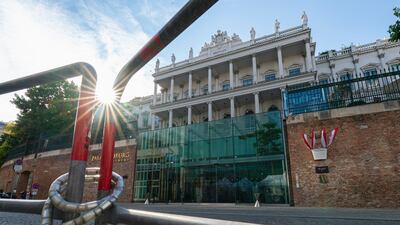Britain, France and Germany have urged Iran not to make "unrealistic demands" as talks resume to revive a 2015 agreement aimed at reining in Tehran's nuclear programme.
Officials from world powers and Iran continued talks in Vienna on Sunday, focusing on unresolved technical aspects of the nuclear deal.
The negotiations are resuming for the first time since March, when talks to bring the US back into the agreement, known as the Joint Comprehensive Plan of Action, stalled.
"Today's talks in Vienna do not mark a new round of negotiations. These are technical discussions," the three countries, known as the E3 group, said on Friday.
"The text is on the table. There will be no reopening of negotiations. Iran must now decide to conclude the deal while this is still possible. We urge Iran not to make unrealistic demands outside the scope of the JCPOA."
Britain, China, France, Germany, Iran, Russia and the US signed the JCPOA in July 2015 as the second term of the US president at the time, Barack Obama, was drawing to a close.
His successor, Donald Trump, unilaterally withdrew the US from the deal in 2018 and reimposed sanctions. Tehran responded by abandoning its obligations under the accord, such as limits on its uranium enrichment and subjecting its nuclear plants to monitoring by the International Atomic Energy Agency.
With enrichment levels now above an unprecedented 60 per cent threshold, IAEA chief Rafael Grossi on Tuesday issued a warning that Iran's nuclear programme was "moving ahead very, very fast". He added that it was "growing in ambition and capacity".
The EU official leading the negotiations, Enrique Mora, has said the renewed talks would focus on the most recent draft to restore the nuclear deal.
Mr Mora is mediating between Iranian and US officials, who will not be involved in face-to-face talks.
A major sticking point could be Iran's insistence that the US remove its terror designation for the Islamic Revolutionary Guard Corps, something Washington says it will not do.
US President Joe Biden has said delisting the IRGC — which is involved in a network of state-linked companies — cannot be part of a nuclear deal.
A senior Iranian official recently told Reuters that Iran now had its "own suggestions that will be discussed in the Vienna talks, such as lifting sanctions on the Guards gradually."
White House national security spokesman John Kirby said the negotiations "are pretty much complete at this point".
"We're not going to wait for ever for Iran to take the deal," Mr Kirby said on Thursday, as the talks resumed in Vienna. "There's a deal on the table. They ought to take it."
'Safeguards' demand
But Iran again implied on Saturday that it was ready for a deal — and that it was the US that was making unrealistic demands for a new accord.
Iran's foreign minister called on Saturday for a "realistic response" from the US to Iranian proposals, state media reported.
"Hossein Amirabdollahian... stressed the need for a realistic US response to Iran's constructive proposals on various issues to make the deal work," state media reported, without providing details on the proposals.
"In all of (President Ebrahim) Raisi's telephone calls with the presidents of France, Russia and China, his firm position has been that a final agreement could be reached only when safeguards claims were resolved and closed," state media on Saturday quoted the deputy head of Mr Raisi's office as saying.
Mr Raisi was referring to what the IAEA calls "comprehensive safeguards agreements". These are legally binding deals with a number of countries that allow the organisation to inspect nuclear research sites and ensure that programmes are not being used for military purposes.
Iranian media suggested another sticking point in the talks to revive the pact may be over Iran's refusal to address alleged unexplained uranium traces as demanded by the IAEA. Tehran had insisted that the nuclear deal had cleared its nuclear programme of alleged possible military dimensions.
In June, the IAEA's board of governors passed a resolution criticising Iran for failing to explain uranium traces found at undeclared sites. But a senior Iranian presidential aide said Tehran demanded the issue be closed before it would agree to resume compliance with the pact.

